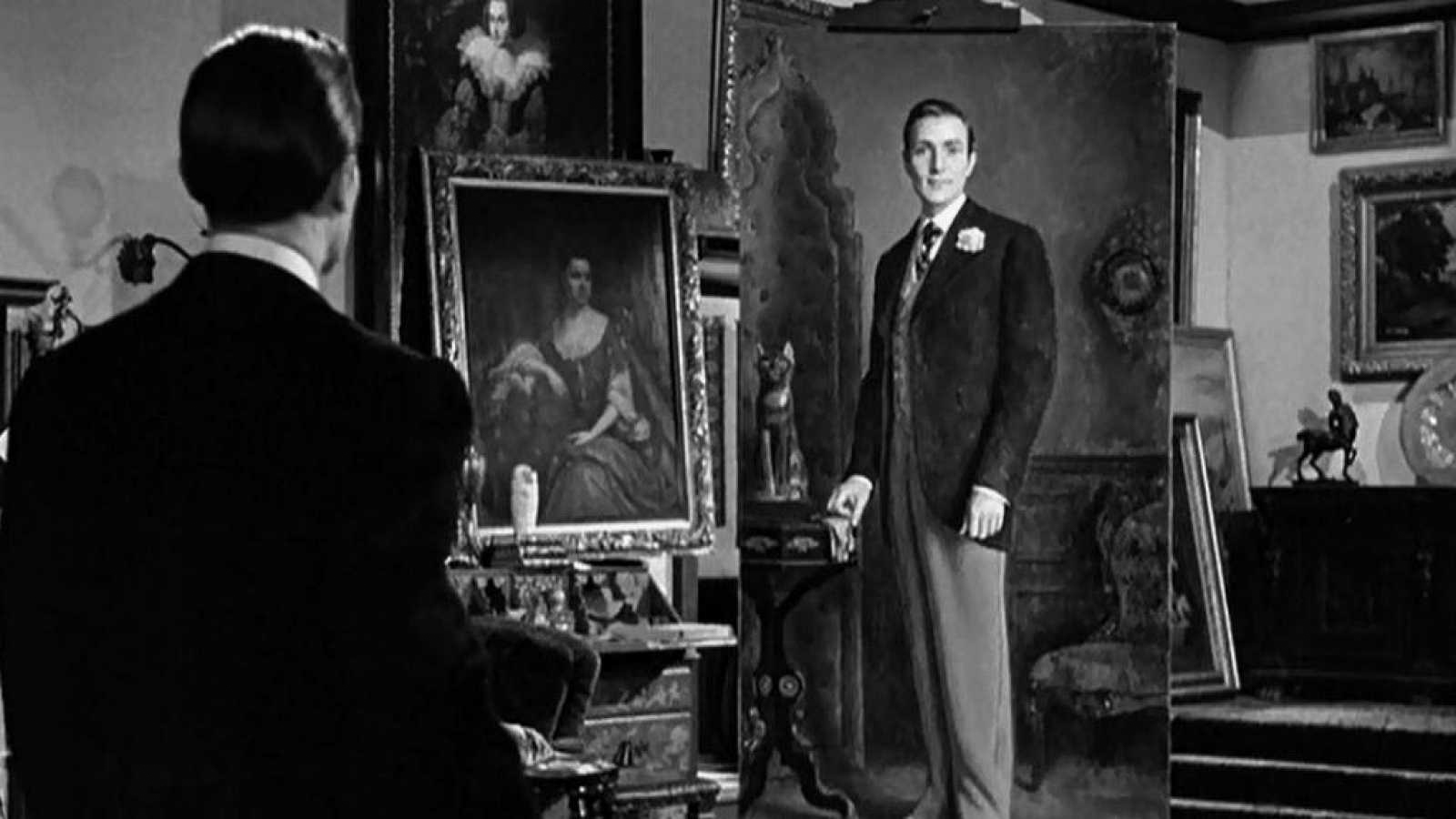El retrato de Dorian Gray (fragmento)
Traducción del inglés por Mariana Collo Reyes
Texto original de Oscar Wilde
Edición por Alejandro Ramírez Pulido
Imagen: «The Portrait of Dorian Gray» de Albert Lewin (captura de pantalla)
Son pocos los que entre nosotros no han despertado alguna vez antes del alba, o bien luego de una de aquellas noches sin sueños que por poco nos hacen amar la muerte, o una de aquellas noches de horror y deforme felicidad, cuando fantasmas más terribles que la realidad misma se deslizan entre las cámaras del cerebro, impulsados por el instinto vital que merodea en todo lo grotesco, y que brinda al arte gótico su persistente vitalidad, siendo este tipo de arte, como es de imaginarse, el arte para aquellas personas en particular cuyas mentes han sido perturbadas por el trastorno de la fabulación. Pálidos dedos atraviesan gradualmente las cortinas, parecen temblar. Con fantásticas formas negras, silenciosas sombras se arrastran por los rincones y allí se agazapan. Afuera, el agitar de los pájaros entre las hojas, o el sonido de los hombres marchando al trabajo, o los suspiros y sollozos del viento bajando por las colinas y deambulando alrededor de la casa silenciosa, como si temiese despertar a los durmientes y sin embargo con el deber de sacarlos de su púrpura cueva. Velo tras velo de delgada gasa oscura se levanta, restaurando grado a grado las formas y colores de las cosas, observamos al alba rehacer al mundo en su antiguo patrón. Los desvaídos espejos regresan a su vida mimética. Las velas sin llama continúan justo donde las dejamos, y a su lado yace medio abierto el libro que habíamos estado estudiando, o el botonier que habíamos usado en el baile, o aquella carta que habíamos temido leer, o que habíamos leído demasiado seguido. No nos parece que algo haya cambiado. De entre las irreales sombras de la noche regresa la realidad que conocíamos. Hemos de continuar allí en donde lo habíamos dejado, y es ahí cuando nos invade una terrible sensación de necesitar que la energía continúe en la misma tediosa secuencia de hábitos estereotipados; o una salvaje añoranza, tal vez, de que nuestros párpados se abran alguna mañana ante un mundo que ha sido remodelado de manera innovadora en la oscuridad para nuestro disfrute, un mundo en donde las cosas tengan formas y colores frescos, estén cambiadas, o tengan otros secretos, un mundo en el que el pasado tiene poca o ninguna cabida, o que, si en cualquier medida sobrevivió, no lo hizo en una forma consciente de obligación o arrepentimiento, pues cada remembranza de felicidad contiene su amargura, y cada recuerdo de placer su dolor.
There are few of us who have not sometimes wakened before dawn, either after one of those dreamless nights that make us almost enamoured of death, or one of those nights of horror and misshapen joy, when through the chambers of the brain sweep phantoms more terrible than reality itself, and instinct with that vivid life that lurks in all grotesques, and that lends to Gothic art its enduring vitality, this art being, one might fancy, especially the art of those whose minds have been troubled with the malady of reverie. Gradually white fingers creep through the curtains, and they appear to tremble. In black fantastic shapes, dumb shadows crawl into the corners of the room and crouch there. Outside, there is the stirring of birds among the leaves, or the sound of men going forth to their work, or the sigh and sob of the wind coming down from the hills and wandering round the silent house, as though it feared to wake the sleepers and yet must needs call forth sleep from her purple cave. Veil after veil of thin dusky gauze is lifted, and by degrees the forms and colours of things are restored to them, and we watch the dawn remaking the world in its antique pattern. The wan mirrors get back their mimic life. The flameless tapers stand where we had left them, and beside them lies the half-cut book that we had been studying, or the wired flower that we had worn at the ball, or the letter that we had been afraid to read, or that we had read too often. Nothing seems to us changed. Out of the unreal shadows of the night comes back the real life that we had known. We have to resume it where we had left off, and there steals over us a terrible sense of the necessity for the continuance of energy in the same wearisome round of stereotyped habits, or a wild longing, it may be, that our eyelids might open some morning upon a world that had been refashioned anew in the darkness for our pleasure, a world in which things would have fresh shapes and colours, and be changed, or have other secrets, a world in which the past would have little or no place, or survive, at any rate, in no conscious form of obligation or regret, the remembrance even of joy having its bitterness and the memories of pleasure their pain.
There are few of us who have not sometimes wakened before dawn, either after one of those dreamless nights that make us almost enamoured of death, or one of those nights of horror and misshapen joy, when through the chambers of the brain sweep phantoms more terrible than reality itself, and instinct with that vivid life that lurks in all grotesques, and that lends to Gothic art its enduring vitality, this art being, one might fancy, especially the art of those whose minds have been troubled with the malady of reverie. Gradually white fingers creep through the curtains, and they appear to tremble. In black fantastic shapes, dumb shadows crawl into the corners of the room and crouch there. Outside, there is the stirring of birds among the leaves, or the sound of men going forth to their work, or the sigh and sob of the wind coming down from the hills and wandering round the silent house, as though it feared to wake the sleepers and yet must needs call forth sleep from her purple cave. Veil after veil of thin dusky gauze is lifted, and by degrees the forms and colours of things are restored to them, and we watch the dawn remaking the world in its antique pattern. The wan mirrors get back their mimic life. The flameless tapers stand where we had left them, and beside them lies the half-cut book that we had been studying, or the wired flower that we had worn at the ball, or the letter that we had been afraid to read, or that we had read too often. Nothing seems to us changed. Out of the unreal shadows of the night comes back the real life that we had known. We have to resume it where we had left off, and there steals over us a terrible sense of the necessity for the continuance of energy in the same wearisome round of stereotyped habits, or a wild longing, it may be, that our eyelids might open some morning upon a world that had been refashioned anew in the darkness for our pleasure, a world in which things would have fresh shapes and colours, and be changed, or have other secrets, a world in which the past would have little or no place, or survive, at any rate, in no conscious form of obligation or regret, the remembrance even of joy having its bitterness and the memories of pleasure their pain.
Son pocos los que entre nosotros no han despertado alguna vez antes del alba, o bien luego de una de aquellas noches sin sueños que por poco nos hacen amar la muerte, o una de aquellas noches de horror y deforme felicidad, cuando fantasmas más terribles que la realidad misma se deslizan entre las cámaras del cerebro, impulsados por el instinto vital que merodea en todo lo grotesco, y que brinda al arte gótico su persistente vitalidad, siendo este tipo de arte, como es de imaginarse, el arte para aquellas personas en particular cuyas mentes han sido perturbadas por la afección de la fabulación. Pálidos dedos atraviesan gradualmente las cortinas, parecen temblar. Con fantásticas formas negras, silenciosas sombras se arrastran por los rincones y allí se agazapan. Afuera, el agitar de los pájaros entre las hojas, o el sonido de los hombres marchando al trabajo, o los suspiros y sollozos del viento bajando por las colinas y deambulando alrededor de la casa silenciosa, como si temiese despertar a los durmientes y sin embargo con el deber de sacarlos de su púrpura cueva. Velo tras velo de delgada gasa oscura se levanta, restaurando grado a grado las formas y colores de las cosas, observamos al alba rehacer al mundo en su antiguo patrón. Los desvaídos espejos regresan a su vida mimética. Las velas sin llama continúan justo donde las dejamos, y a su lado yace medio abierto el libro que habíamos estado estudiando, o el botonier que habíamos usado en el baile, o aquella carta que habíamos temido leer, o que habíamos leído demasiado seguido. No nos parece que algo haya cambiado. De entre las irreales sombras de la noche regresa la realidad que conocíamos. Hemos de continuar allí en donde lo habíamos dejado, y es ahí cuando nos invade una terrible sensación de necesitar que la energía continúe en la misma tediosa secuencia de hábitos estereotipados; o una salvaje añoranza, tal vez, de que nuestros párpados se abran alguna mañana ante un mundo que ha sido remodelado de manera innovadora en la oscuridad para nuestro disfrute, un mundo en donde las cosas tengan formas y colores frescos, estén cambiadas, o tengan otros secretos, un mundo en el que el pasado tiene poca o ninguna cabida, o que, si en cualquier medida sobrevivió, no lo hizo en una forma consciente de obligación o arrepentimiento, pues cada remembranza de felicidad contiene su amargura, y cada recuerdo de placer su dolor.
Mariana Collo Reyes tiene 19 años, nació en Popayán, pero actualmente vive en Medellín, ya que está estudiando la carrera de Traducción Inglés – Francés – Español de la Universidad de Antioquia. Hizo parte de los estudiantes de la Escuela de Traducción Literaria de Idartes en articulación con la ACTTI. Su interés por la traducción literaria proviene del deseo de comprender más a fondo a las personas que más le ha gustado leer a lo largo de su vida, y es esa la razón por la que hoy se ha decidido por la traducción de un fragmento de la única novela de Oscar Wilde: El retrato de Dorian Gray.

